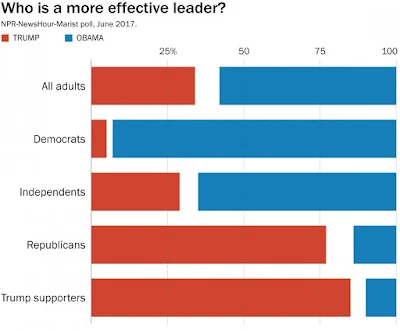There are two interpretations of the malicious tweeting and pervasive lying by the apprentice dictator in the White House. The first and the most frequent is that he is out of control, impulsive and unhinged. Richard Wolffe's column represents this point of view, but he is one among many. Some suggests this mania has increased since inauguration.
The other point of view is expressed most eloquently by Rachel Maddow. She proposes that his attention-getting outrages are strategic, unleashed when the a.d. needs media attention to move away from more damaging stories, such as the latest in the Russia connection, or the sordid healthcare bill mess.
Update: There is a second "strategy" that has also been mentioned recently: the political one of playing to his base, which is fairly small, but it multiplies by being the core of the Republican party which reflexively follows it. This strategy makes the most sense when filtered through Fox News and the rabid right radio rants.
The question also can be raised about most of the current regime's actions. By and large they have been bumbling, so badly structured that major pieces of them fall apart immediately, or totally deceptive in that they are at best p.r. releases, not actionable orders or legislation.
For instance, the White House commission request to obtain detailed data on all individual voters in all the states. For various reasons, including contradictory statements on how this data will be used (made public? locked up tight?) most states have so far refused--some colorfully:
The pushback was bipartisan: The Mississippi secretary of state, Delbert Hosemann, a Republican, said Friday that he had not received a request from the commission, but colorfully suggested he would not honor one if it came.
“My reply would be: They can go jump in the Gulf of Mexico, and Mississippi is a great state to launch from,” Mr. Hosemann said in a statement. “Mississippi residents should celebrate Independence Day and our state’s right to protect the privacy of our citizens by conducting our own electoral processes.”
The stated intent of gathering this information is to investigate whether there was widespread fraudulent voting in the last election, for which there is zero evidence and which only the apprentice dictator believes happened.
Is this omnivorous demand for data just another product of pique (to justify the absurd assertion that he would have won the popular vote but for fraud) in the usual blunt overkill manner? Or is it strategic? And to what end?
The reason many see is to further the GOP crusade to suppress voting when it might be against them. There are other possibilities just as sinister and perhaps even more so. What if this detailed data is funneled only to the GOP, to target misinformation and other political dirty tricks to the most vulnerable? Such an operation is reportedly part of the Russian connection investigation.
On an even larger scale, besides being a goldmine for thieves that should outrage everyone (for the request includes last four digits of S.S. #) is it a database for more general suppression? It is the kind and extent of information a dictator needs for his secret police.
So which is it--insanity or strategic genius? There's no way to know, so it's best to concentrate on what the actual effects are--that is, for the effects that don't depend on knowing the answer. Because in a sense it doesn't matter.
Whether outrageous tweets are designed to change the subject, they in fact do, and that must be resisted. People can point out the shocking and deeply sad damage to the presidency and the country that they cause, but the subject doesn't have to dominate every news and cable show for several news cycles, nor need it be the subject of every opinion column and analysis.
Similarly, the resistance to this outrageous demand for voter data--backed by the apprentice dictator's Nixonian, HUAC, dictator-like statement (what are they hiding?)--is necessary for whatever the reason for it was. The attention should be, as it has been so far, on the possible effects that cannot be risked.
And it is important to go back and find those stories that have been obscured, as Rachel did when she also mentioned the defunding of the federal Election Assistance Commission, which is the only federal agency working with the states on cybersecurity of voting machines and other aspects of the election process.
Another related, undercovered story is that Homeland Security has refused to check voting machines to see if any were hacked during the 2016 election, even as concern over Russian interference increases.
These acts, when taken together and placed beside the suspicions still being investigated concerning collusion with a foreign dictatorship to determine an electoral outcome, are ominous fragments suggesting a very dark future for U.S. democracy.
Origins: The Winter Solstice
-
The Winter Solstice is considered the most celebrated annual event in the
history of human cultures around the world. Ancient structures survive in
m...
2 weeks ago























